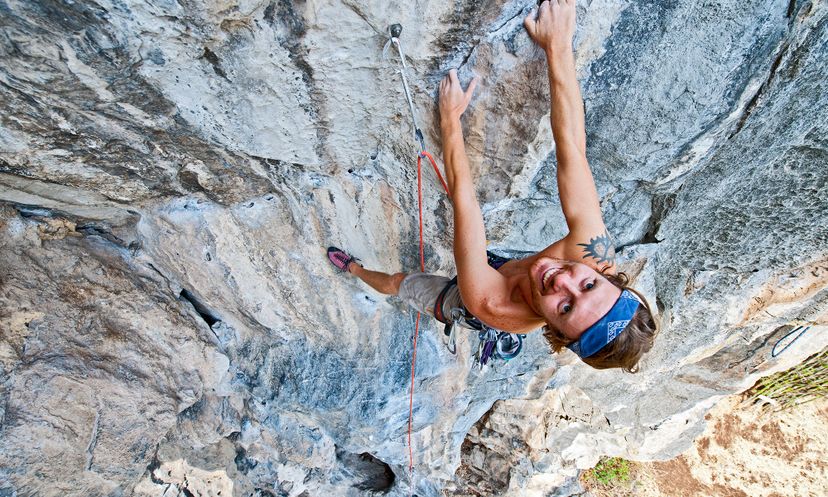
About This Quiz
Rock climbing involves strength, control and finesse. There is an element of danger as well. If you are excited about scaling a vertical piece of stone, then take this quiz to learn more about rock climbing.Rock climbing is a little like skydiving. Both rock climbing and skydiving have an element of danger. Both are sports where people participate mostly for their own personal satisfaction and do not offer much for spectators.
Traditional rock climbing is the most common form of the sport and is covered most in documentaries and movies.
In sport climbing, the climber doesn't have to carry along protective equipment or place it along the way. This makes it safer, faster and less expensive than traditional climbing.
Advertisement
Free solo climbing is like sport climbing, except without a rope. If you fall, you risk dying.
Indoor climbing is like sport climbing, except that climbers scale indoor climbing structures made of plywood or concrete and hold onto artificial handholds/footholds bolted onto the structure.
Ice climbing is like traditional climbing except that the climber scales an ice formation, such as a frozen waterfall or a glacier. Specialized equipment that can screw into the ice is used instead of the wedges, nuts and cams used on rock formations.
Advertisement
Bouldering is like sport climbing, but you climb on boulders rather than cliffs and crags. Because the maximum height of a boulder is typically ten feet or so, there is not usually far to fall.
A climber does most of the work of climbing using the legs. Climbers try to keep their centers of gravity over their feet and then push upwards with their legs.
Ideally, climbers use their arms and hands only for balance and positioning.
Advertisement
There are six classes in this system, ranging from class 1 (normal walking) through hiking, scrambling and then rock climbing at class 5. This class is subdivided into 14 categories of increasing difficulty. Class 6 is rock walls so smooth that they can be climbed only with artificial aids.
Within the 14 categories of class 5 rock climbing, 5.0 through 5.4 is the beginner level -- easy to climb, like a ladder.
Probably the best way to get started in rock climbing today is to go to an indoor climbing facility and take lessons. There you will learn the basic techniques in a safe environment, build your strength and skills, and meet other climbers.
Advertisement
If you want to move beyond sport climbing and try advanced routes or routes in remote areas, then you must learn how to place protection equipment and try out traditional climbing. In making the jump to traditional climbing, it is essential to find a partner or hire a guide/instructor with traditional climbing experience so that you can learn how to safely place protection yourself.
At the minimum you need climbing shoes, harness and carabiners for attaching the harness to the rope, gloves or hand chalk, a dozen quickdraws, a belay device and a rappelling device, rope, and a helmet.
The first climber to climb the route is known as the lead climber. While he or she is climbing, the lead climber is protected by the rope attached to the harness of the partner, who is known as the belayer. The belayer runs the rope through a belay device and feeds it out as the lead climber rises.
Advertisement
The maximum distance that the lead climber can fall is equal to twice the distance between the last bolt and his/her current position, plus the length of slack left in the line by the belayer, plus the stretch of the rope.
The lead climber can climb to a maximum height equal to about half the length of the rope. If the lead climber goes any higher than that, it will not be possible for the belayer to lower him or her back to the ground if the lead climber falls and is injured.
Upon climbing to the first ledge on the mountain wall, the lead climber will tie onto an anchor in the rock with a short piece of rope or webbing, and the two climbers switch roles.
Advertisement
Once the lead climber and the second climber are together again, they have completed the first pitch. They will then repeat the process to climb the second pitch, and so on, until they reach their destination.
The lead climber places protection into cracks as he or she climbs, and the second climber removes all of them as he or she follows. The placement of protection is obviously a crucial skill, since protection devices are the only thing that stand between life and death in a fall. The protection must be placed so that it locks into the rock and holds firm during the stress of a fall.